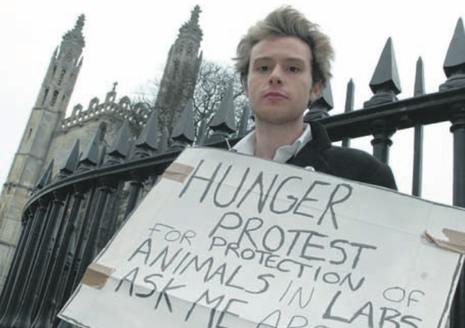Hunger strike for animal rights
A man has been protesting in Cambridge this week against potential changes to animal rights laws

A man underwent a hunger strike this week in protest against Government plans that could lead to animal suffering.
22-year-old Edmund Maile began his strike on Saturday to highlight changes to animal rights laws which could come into force in 2013. He stood outside the Senate House, King’s Parade, and only drank water.
Mr Maile handed out postcards to send to David Cameron condemning the new European Union directive which would see Britain’s laws on the treatment of animals in laboratories fall in line with the rest of Europe.
This directive could dismantle Britain’s current laws, which are widely seen as effective, replacing them with lower levels of animal rights.
This means animals may be exposed to long-lasting suffering, severe pain or inhumane methods of killing.
Of his method, Mr Maile, of Chesterton, said: “If that is what it takes to get people’s attention then that is what I will do.
“I have been getting huge amounts of support but it will only be a success if the legislation is not passed.”
Despite suffering heckling and abuse on the city streets, he had the support of Animal Rights Cambridge.
Sue Hughes, a member of this group, said: “People have been going to check on him on a regular basis to support him…he wants to inform the public about what is going on.”
The RSPCA has also announced its opposition to any weakening of British laws.
Head of the RSPCA’s research animals department, Dr Maggy Jennings, said: “Successive governments have made proud claims that the UK has the highest standards in the world for animal research are testing.’”
She calls the possibility that this legislation could be weakened as “unacceptable.”
Changes to laws about the treatment of animals in laboratories are particularly relevant to Cambridge, since the University uses animals for some of its research.
A Freedom of Information Act revealed last year that 117,212 experiments involving animals were conducted in 2009 in University laboratories, mostly involving mice.
Responding to a fresh outbreak of criticism, a University spokeswoman said: “Without animal research, which is only used when there is no alternative, many treatments we take for granted today would not be possible.”
 Interviews / ‘People just walk away’: the sense of exclusion felt by foundation year students19 April 2024
Interviews / ‘People just walk away’: the sense of exclusion felt by foundation year students19 April 2024 News / Copycat don caught again19 April 2024
News / Copycat don caught again19 April 2024 News / AMES Faculty accused of ‘toxicity’ as dropout and transfer rates remain high 19 April 2024
News / AMES Faculty accused of ‘toxicity’ as dropout and transfer rates remain high 19 April 2024 Theatre / The closest Cambridge comes to a Drama degree 19 April 2024
Theatre / The closest Cambridge comes to a Drama degree 19 April 2024 News / Acting vice-chancellor paid £234,000 for nine month stint19 April 2024
News / Acting vice-chancellor paid £234,000 for nine month stint19 April 2024





